Review for Les Miserables
Perhaps, like me, you’re not a fan of the recent ‘Les Miserables’ musical adaptation to film. Nothing wrong with it particularly but I’ve also endured the theatrical production and didn’t really like that either. The only tenuous link between that film and this one is the title and narrative frame-work. You really shouldn’t be put off seeing this incredible film because of that. Despite knowing this, it took me a while get motivated to watch what is almost a six-hour opus – and I’m very pleased I eventually did.
Raymond Bernard’s adaptation is generally seen as the most accurate reflection of Victor Hugo’s classic book (which spanned 1500+ pages) and is much-loved, particularly in France, to this day.
As the book was so long Bernard refused to tackle it in less than three parts and Pathe (the studio funding it) reluctantly agreed. It was a master-stroke with the film being released as three separate films, all within days of each other. (Peter Jackson take note!).
Bernard's film, released in 1934, is still relatively early days for a French produced ‘talkie’. For those unfamiliar with the story, it traces the intersecting story of history of ex-convict Jean Valjean (Harry Baur), the spiteful Inspector Javert (Charles Vanel); and Fantine (Florelle, née Odette Rousseau) who sells herself into prostitution for the welfare of her daughter Cosette (Gaby Triquet as the young girl Cosette, and Josseline Gaël as the young woman). It’s also set against the turbulent political back-drop of a turbulent 19th Century France. For many fans of the hefty novel, this remains the definitive version although the later (and shorter) Charles Laughton version is also much lauded.
The narrative itself is relatively straight-forward although it effectively spans the lifetime of its leading protagonists. The poverty stricken Jean Valjean is thrown into jail for years for stealing bread and, when he re-emerges into society he changes his name and succeeds as a do-gooder; eventually becoming town mayor. But, like all great tragedies, he is recognised and threatened with exposure. Meanwhile, he tries to reunite a poor mother who has tuberculosis and little time to live with her long-lost daughter. All this against a back-drop of the 1832 uprising in gay Paris.
The film is broken into three segments – a trilogy if you will. ‘Une Tempête Sous un Crane’ (A Storm Beneath A Skull), ‘ Les Thénardier’ (The Tenardiers) and finally ‘Liberté, Liberte Cherie’ ( Liberty, Sweet Liberty). They’re presented as separate films on the discs with two on the first disc and the third, plus extras on the second. They almost all stand alone and yet their characters and plots do all intertwine. I watched them in intended order which is certainly recommended.
The first focuses primarily on Jean Valjean who questions the validity of God. We also meet the beautiful and young version of Fantine (Florelle, Gervaise), the young child version of Cosette (Gaby Triquet) and Inspector Javert (Charles Vanel). It sets up the plot beautifully.
Next up, in ‘ The Tenardiers’ we see Cossette growing up (Josselyne Gael) and a plot which pretty much centres on Javert and in ‘Liberty, Sweet Liberty’ the key focus is on the Paris uprising of 1832 whilst also resolving all of the narrative strands between key characters. We also meet Marius (Jean Servais), Cosette's lover and a revolutionary as well as young beggar boy, Gavroche (Emile Genevois, Casque d'Or) who becomes a leader of the oppressed and something of a folk-hero.
It must have been an expensive film to make. In the third film, the sheer scale and number of actors required to bring the street battles and the siege to life are pretty remarkable.
The film looks utterly stunning on this transfer with deeply satisfying high contrast black and white cinematography as well as plenty of inventive shots that add to the emotional realism of the piece. It’s presented in its original aspect ratio of 1.37:1 and apparently uses Pathe's 4K restoration and reconstruction which has been much lauded.
It moves apace too. Despite racking up well over 5 hours airtime in total, you won’t feel the time pass as the films draws you in to its highly charged and melodramatic narrative.
There are a host of supplementary extras here too all housed on the second disc.
First up is a 23 minute academic appraisal of Victor Hugo adaptations in cinema with a particular focus on Bernard’s version, comprising a lengthy interview with French academic Claudine Cohen. It’s in French with English subs and is fairly light and informative.
Next is an extract from a 1970’s television interview with Director Raymond Bernard (11 mins) which offers fascinating first-hand insight into making the films.
There follows a 19 minute contemporary interview with French cinema expert Raymond Chirat who was responsible for creating the Bibliotheque Raymond Chirat at the Institut Lumiere in Lyon, and who certainly knows his onions (No French stereotyping intended!).
There’s a 2 minute newsreel from 1933 featuring some screen tests for the ‘street urchins’. Many of the children featured are very impressive.
Other newsreels included show the cast of ‘Les Mis’ at a public ceremony in 1933 as well as a poem read by Caby Triquet who plays Cossette in the film, based around Hugo’s ‘Little White Beds’.
Also included are a handful of slightly inconsequential deleted scenes (3 mins), a trailer and the first half of an earlier Pathe adaptation of the second book, the silent film ‘Le Chemineau’ (The Vagabond) Albert Capellani's short film from 1905. It is presented here with additional colour tinting.
The package also ships with a highly informative 28-page illustrated booklet featuring related writings on the film – some from back in the day and some contemporary.
All in all a really great set featuring all three films which make up a near perfect cinematic portrayal of the classic book. It’s also a breath-takingly good transfer. All self-respecting cinephiles will need this in their collection.
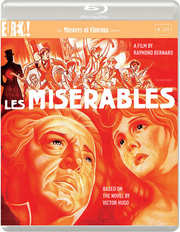
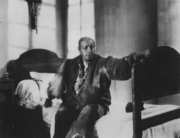
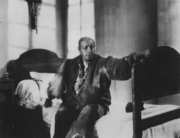
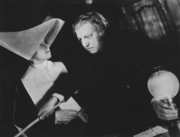
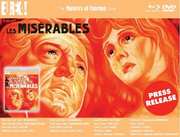



































Your Opinions and Comments
Be the first to post a comment!